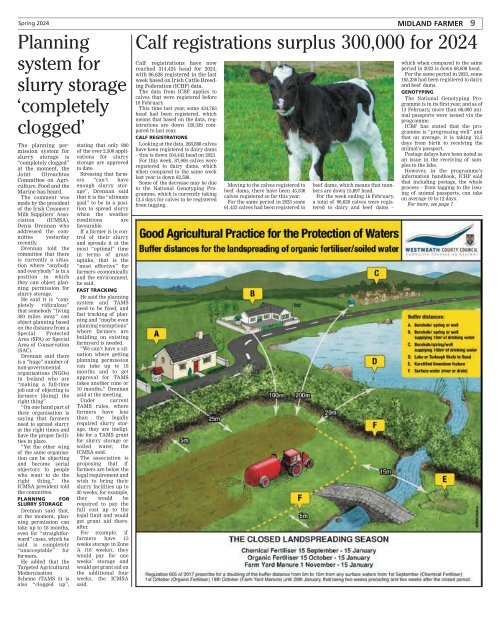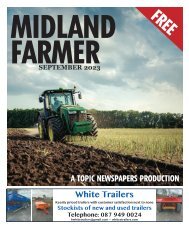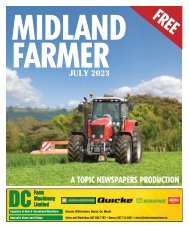Midland Farmer - Spring 2024
Create successful ePaper yourself
Turn your PDF publications into a flip-book with our unique Google optimized e-Paper software.
<strong>Spring</strong> <strong>2024</strong><br />
Planning<br />
system for<br />
slurry storage<br />
‘completely<br />
clogged’<br />
The planning permission<br />
system for<br />
slurry storage is<br />
“completely clogged”<br />
at the moment, the<br />
Joint Oireachtas<br />
Committee on Agriculture,<br />
Food and the<br />
Marine has heard.<br />
The comment was<br />
made by the president<br />
of the Irish Creamery<br />
Milk Suppliers’ Association<br />
(ICMSA),<br />
Denis Drennan who<br />
addressed the committee<br />
yesterday<br />
recently.<br />
Drennan told the<br />
committee that there<br />
is currently a situation<br />
where “anybody<br />
and everybody” is in a<br />
position in which<br />
they can object planning<br />
permission for<br />
slurry storage.<br />
He said it is “completely<br />
ridiculous”<br />
that somebody “living<br />
300 miles away” can<br />
object planning based<br />
on the distance from a<br />
Special Protected<br />
Area (SPA) or Special<br />
Area of Conservation<br />
(SAC).<br />
Drennan said there<br />
is a “huge” number of<br />
non-governmental<br />
organisations (NGOs)<br />
in Ireland who are<br />
“making a full-time<br />
job out of objecting to<br />
farmers [doing] the<br />
right thing”.<br />
“On one hand part of<br />
their organisation is<br />
saying that farmers<br />
need to spread slurry<br />
at the right times and<br />
have the proper facilities<br />
in place.<br />
“Yet the other wing<br />
of the same organisation<br />
can be objecting<br />
and become serial<br />
objectors to people<br />
who want to do the<br />
right thing,” the<br />
ICMSA president told<br />
the committee.<br />
PLANNING FOR<br />
SLURRY STORAGE<br />
Drennan said that,<br />
at the moment, planning<br />
permission can<br />
take up to 18 months,<br />
even for “straightforward”<br />
cases, which he<br />
said is completely<br />
“unacceptable” for<br />
farmers.<br />
He added that the<br />
Targeted Agricultural<br />
Modernisation<br />
Scheme (TAMS 3) is<br />
also “clogged up”,<br />
stating that only 800<br />
of the over 2,500 applications<br />
for slurry<br />
storage are approved<br />
to date.<br />
Stressing that farmers<br />
“can’t have<br />
enough slurry storage”,<br />
Drennan said<br />
that it is the “ultimate<br />
goal” to be in a position<br />
to spread slurry<br />
when the weather<br />
conditions are<br />
favourable.<br />
If a farmer is in control<br />
of their slurry<br />
and spreads it at the<br />
most “optimal” time<br />
in terms of grass<br />
uptake, that is the<br />
“most effective” for<br />
farmers economically<br />
and the environment,<br />
he said.<br />
FAST TRACKING<br />
He said the planning<br />
system and TAMS<br />
need to be fixed, and<br />
fast tracking of planning<br />
and “maybe even<br />
planning exemptions”<br />
where farmers are<br />
building on existing<br />
farmyard is needed.<br />
“We can’t have a situation<br />
where getting<br />
planning permission<br />
can take up to 18<br />
months and to get<br />
approval for TAMS<br />
takes another nine or<br />
10 months,” Drennan<br />
said at the meeting.<br />
Under current<br />
TAMS rules, where<br />
farmers have less<br />
than the legally<br />
required slurry storage,<br />
they are ineligible<br />
for a TAMS grant<br />
for slurry storage or<br />
soiled water, the<br />
ICMSA said.<br />
The association is<br />
proposing that if<br />
farmers are below the<br />
legal requirement and<br />
wish to bring their<br />
slurry facilities up to<br />
20 weeks, for example,<br />
they would be<br />
required to pay the<br />
full cost up to the<br />
legal limit and would<br />
get grant aid thereafter.<br />
For example, if<br />
farmers have 15<br />
weeks storage in Zone<br />
A (16 weeks), they<br />
would pay for one<br />
weeks’ storage and<br />
would get grant aid on<br />
the additional four<br />
weeks, the ICMSA<br />
said.<br />
MIDLAND FARMER<br />
Calf registrations surplus 300,000 for <strong>2024</strong><br />
Calf registrations have now<br />
reached 314,424 head for <strong>2024</strong>,<br />
with 96,628 registered in the last<br />
week based on Irish Cattle Breeding<br />
Federation (ICBF) data.<br />
The data from ICBF applies to<br />
calves that were registered before<br />
16 February.<br />
This time last year, some 434,763<br />
head had been registered, which<br />
means that based on the data, registrations<br />
are down 120,339 compared<br />
to last year.<br />
CALF REGISTRATIONS<br />
Looking at the data, 268,888 calves<br />
have been registered to dairy dams<br />
– this is down 104,442 head on 2023.<br />
For this week, 87,906 calves were<br />
registered to dairy dams, which<br />
when compared to the same week<br />
last year is down 62,588.<br />
Some of the decrease may be due<br />
to the National Genotyping Programme,<br />
which is currently taking<br />
12.5 days for calves to be registered<br />
from tagging.<br />
Moving to the calves registered to<br />
beef dams, there have been 45,536<br />
calves registered so far this year.<br />
For the same period in 2023 some<br />
61,433 calves had been registered to<br />
beef dams, which means that numbers<br />
are down 15,897 head.<br />
For the week ending 16 February,<br />
a total of 96,628 calves were registered<br />
to dairy and beef dams –<br />
9<br />
which when compared to the same<br />
period in 2023 is down 68,608 head.<br />
For the same period in 2023, some<br />
165,236 had been registered to dairy<br />
and beef dams.<br />
GENOTYPING<br />
The National Genotyping Programme<br />
is in its first year, and as of<br />
13 February, more than 66,000 animal<br />
passports were issued via the<br />
programme.<br />
ICBF has stated that the programme<br />
is “progressing well” and<br />
that on average, it is taking 12.5<br />
days from birth to receiving the<br />
animal’s passport.<br />
Postage delays have been noted as<br />
an issue in the receiving of samples<br />
to the labs.<br />
However, in the programme’s<br />
information handbook, ICBF said<br />
that including postage, the whole<br />
process – from tagging to the issuing<br />
of animal passports, can take<br />
on average 10 to 12 days.<br />
For more, see page 7
















